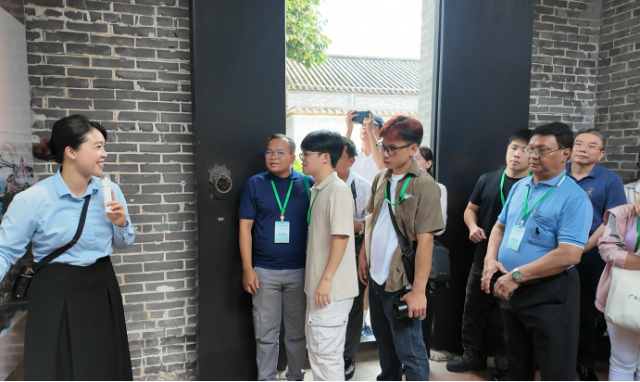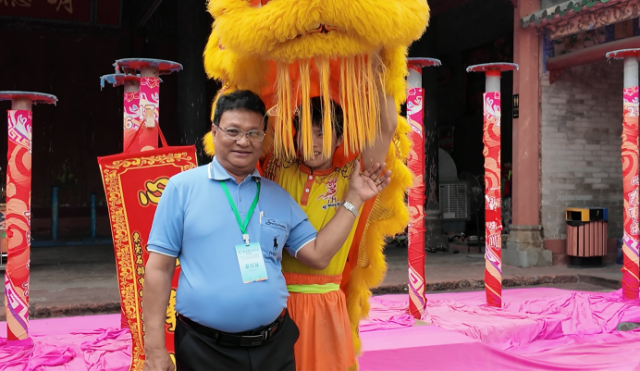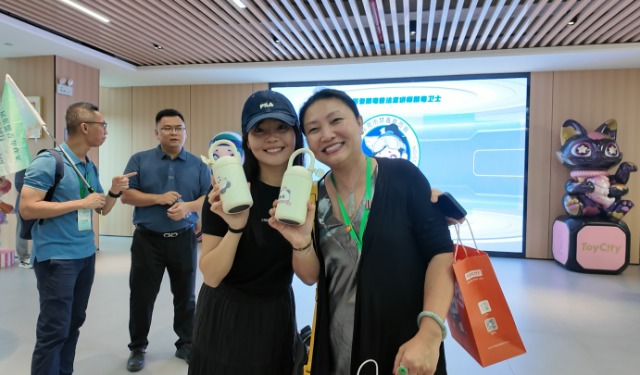From the rhythmic beats of lion dance performances to the quiet elegance of Lingnan gardens, the 2nd Journey of ASEAN Young Writers in China's Guangdong leg became a vibrant tapestry of cultural exchange.
From May 26 to 27, organized by the International Department of China Writers Association and Guangdong Writers Association, the event brought together 25 ASEAN delegates and 20 Chinese writers, weaving literary dialogues across Foshan and Dongguan.
The delegation immersed themselves in cultural landmarks, including Foshan's Ancestral Temple housing the Huang Feihong Memorial Hall, the historic Wanfu Cantonese Opera Stage, and the classical Liang's Garden.

Delegates from ASEAN countries visit Liang's Garden in Foshan.
A highlight was the lion dance performed by Dongguan's Mingde Troupe, followed by a creative dialogue with ToyCity, China's rising toy brand.
The writers' observations reflected deeper historical connections. Ohn Maung, an eight-time National Literary Award winner from Myanmar, drew parallels between ancient and modern exchanges: "From merchants to artists, ancient Chinese nurtured both scholarship and artistry while defending their homeland. Today's literary collaborations – like China-ASEAN partnerships – deepen mutual affection."

Veteran writer Ohn Maung from Myanmar interacts with local lion dance crew in Dongguan, Guangdong.
"This trip from Guangxi to Guangdong is crafting a new chapter for China-ASEAN cultural ties," he added. Now as the President of the Myanmar Writers' Association (MWA), his poems have bridged eight ASEAN nations.
Singaporean writer Lin Yijun found unexpected inspiration in China's pop culture phenomena. "I brought two Lauras here," she laughed, holding up blind box figures. "Actually, before that, I had no experience with blind boxes. This is my first time buying one in China." Observing her colleagues' growing fascination, she noted: "At our workplace, you can see 'blind boxes' everywhere. I do see this trend coming to Singapore."

Singaporean writer Lin Yijun shares the water bottle she bought at ToyCity.
For Malaysian essayist Ong Jing Heng, 27, the journey carried ancestral echoes. "This is my first time in southern China, which is the hometown of my ancestors," said Ong, whose family roots trace back to Guangdong's Puning. "There's a sense of familiarity here – traditions passed down to Malaysian youth coexist with experimental elements we can explore." He emphasized the value of cross-border dialogues: "When writers break out of their comfort zones, it pushes the limits of our craft."
As delegates explored ToyCity's whimsical designs, Lin captured the zeitgeist: "Meeting writers from Southeast Asian cities here feels precious. We're translating millennia of shared roots into fresh stories."
With over 2,000 poems bridging Myanmar to Malaysia and beyond, Ohn Maung concluded: "When cultures preserve traditions while embracing reinvention, they write humanity's collective future."
The journey continues as these young voices draft what organizers call "a living manuscript" of ASEAN-China camaraderie.
Reporter: Guo Zedong, Tan Weizheng(intern)
Cameraman: Guo Zedong
Video editor: Ou Nanying
Video cover: Ou Nanying
Photo: Guo Zedong
Editor: Yuan Zixiang, James, Shen He
















